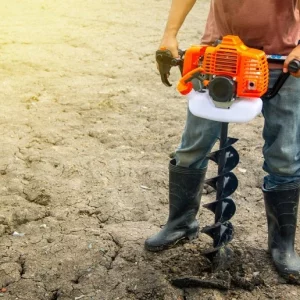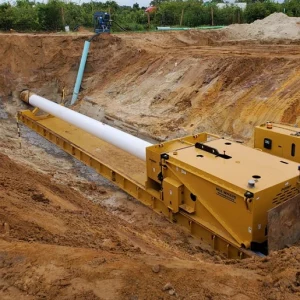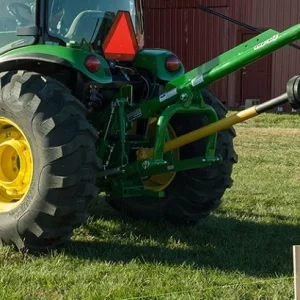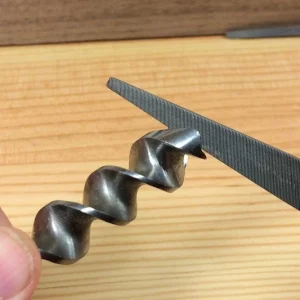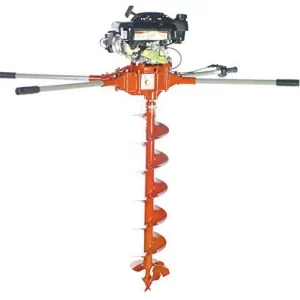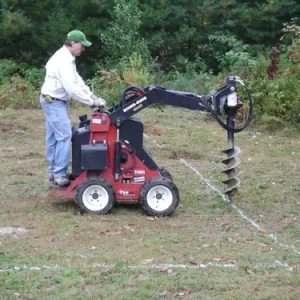Beneath the surface of gardening and landscaping lies a complex world of soil types. Among these, clay soil stands out for its unique characteristics that both perplex and fascinate gardeners and homeowners alike. If you’ve ever tried to dig into clay soil, you know the struggle: it’s dense, heavy, and can feel like an insurmountable obstacle. But why dont we use augers? Do Augers Work in Clay Soil?
While it seems like a simple question, the intricate dynamics of soil texture and auger mechanics can make the answer a tad complex.
Yes, augers do work in clay soil. The functionality of augers in clay soil is attributable to their design, strength, and rotation mechanism. When it comes to challenging terrains, especially like clay, augers can be a game-changer for many gardening and construction endeavors.Do Augers Work in Clay Soil?
Reasons Why Augers are Effective in Clay Soil?
- Spiral Blade Design: The blade’s design ensures continuous soil removal, even in dense terrains
- Rotation Mechanism: Augers rotate, breaking down the hard, compacted layers of clay soil
- Strength & Durability: Many augers are built to withstand challenging soil types
- Size Variability: Augers come in various sizes, making it feasible to select one according to the clay soil’s toughness
- Efficiency: With an auger, the time and energy spent on digging in clay soil significantly reduces.
Now, Let’s get to know more about the base i.e the clay soil.
Understanding Clay Soil in detail
Clay soil, characterized by its composition of fine mineral particles and limited organic matter, presents a distinctive challenge to gardeners. This soil type possesses a notably adhesive texture due to the minimal gaps between its mineral particles, leading to poor drainage capabilities. Clay soil is primarily characterized by its fine texture and its capacity to retain water. Unlike sandy or loamy soil, clay is sticky, dense, and can be challenging to work with.
Properties of Clay Soil
Embracing both advantages and drawbacks, clay soil exhibits a range of unique properties:
- Impressive Water Retention: One of the notable benefits of clay soil is its remarkable water-holding capacity. This attribute works as a boon during dry summers, as the soil can sustain moisture levels for longer periods, reducing the risk of drought stress for plants.
- Nutrient Abundance: Clay soil often serves as a hidden treasure trove of vital minerals that plants require for nourishment. These nutrient-rich qualities can contribute to healthier growth and improved yields, turning the soil into a reservoir of plant sustenance.
- Compaction Conundrums: However, this soil’s advantages come with a trade-off. The dense composition of clay soil makes it prone to compaction, where its particles compress closely together. Unfortunately, this leads to restricted space for root expansion, impeding plants’ ability to establish a robust foundation.
- Practical Implications: Augers in Real-life Scenarios
- Gardening: Whether you’re planting a tree or setting up a fence, augers make the process seamless in clay soil
Building Foundations: In construction, augers aid in creating stable, deep holes for the foundation, especially in clay-heavy regions - Agricultural Uses: For farmers, augers simplify tasks like installing irrigation systems or digging post holes.
Potential Challenges and Solutions
While augers can be incredibly beneficial, they are not without challenges:
- Over-Compaction: In clay soil, augers might further compact the soil. Solution? Use a broader auger blade.
- Blade Wear: Clay soil can wear down the blade quickly. Regular maintenance and blade replacement can help.
- Energy Consumption: Powered augers, especially in clay soil, can consume more fuel. Being mindful of fuel consumption and ensuring the machine’s efficiency can be pivotal.
Also, Read:
FAQs on Do Augers Work in Clay Soil?
Clay soil is dense, compact, and retains a lot of water, making it hard to dig and cultivate. While possible, regular tools might not be as efficient. Augers and other specialized tools can make the job easier. Yes, some augers are specifically designed to tackle tougher terrains like clay soil. Regular cleaning, ensuring the blade is sharp, and timely maintenance checks can prolong your auger’s life. It depends on how often you’ll be using it. For frequent use or larger tasks, investing in a powered auger can be beneficial. Depth depends on the auger’s size and type. Some can dig up to 4 feet deep or more in clay soil.Why is clay soil challenging to work with?
Can regular garden tools be used in clay soil?
Are there different auger designs for clay soil?
How do I maintain my auger after using it in clay soil?
Is it worth investing in a powered auger for a small garden with clay soil?
How deep can augers dig in clay soil?
Conclusion
So, Do Augers Work in Clay Soil?. In a nutshell, yes! Augers, with their robust design and powerful mechanism, have revolutionized how we approach dense terrains like clay soil. Whether you’re a passionate gardener, a farmer, or a constructor, using an auger can make a world of difference in your work. Before you set out on your next digging adventure, remember: with the right tools, even the toughest soils can become a playground!


